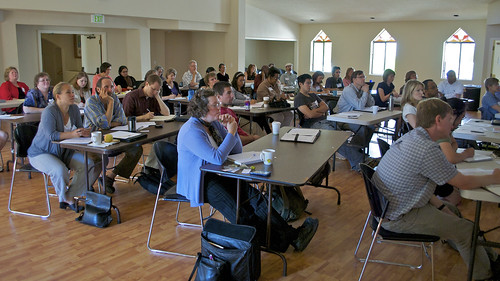Last year, we hosted a workshop called How To Bring About Large-Scale Behavior Change, taught by Joe Brewer. It was our best-attended workshop of the year, and people loved it and seemed to leave it buzzing with ideas, so we're running it again, only this time we're going further.
The one complaint that many participants had last year was that in a one-day workshop (realistically 6½ hours after breaks are accounted for) with a lot of material to cover, there wasn't enough time for hands-on practice. This time round, we're breaking it into 3 half-day sessions, with a couple of weeks between each so people can mull over the material, and the final one will be devoted to practice and feedback:
- On July 30, we'll start with Getting the Big Picture, covering the theoretical background from cognitive science, and examples of successful behavior change campaigns that we can learn from.
- On August 13, we'll have Tools for Social Change Campaigns, in which Joe will introduce a 'designers toolkit' for social change, applying the groundwork from part 1 to practical methods for understanding and driving the process of change.
- On September 10, we'll finish with a Design Lab for Your Campaign. Each participant will create an action plan for a behavior change campaign, and we'll critique each others' so we can all learn from each other.
I'm really excited about this class, but we also recognise that a lot of people who are interested won't be able to make it to three separate sessions spread out in time like that. If you're one of those people, we have an alternative for you: we're raising money to write a Designer's Manual for Large-Scale Change which will be free to download and stand alone as an introduction to the same ideas. Here's short video of Joe introducing the project:
We would of course very much appreciate your contribution; if you'd like to donate or read more, head over to:
As with many of the classes we put on, I am sometimes asked why Sustainable Seattle is interested in promoting this particular topic. The environmentalist angle on this is that I firmly believe that we already have all the technology we need to deal with the environmental crises looming over us, and what we really need to do is persuade people to make the right choices. Lately we've been talking about happiness, and the links to that are are actually quite similar. Whether we look at individuals' happiness, or the ways that each of our behavior affects everybody else's happiness, we find ourselves presented with a quite well developed body of knowledge about things we could be doing to make the world, and yet most people aren't doing them. Many of these things are well-known and very easy, so clearly we need to get better at persuading people.
Whether your interest is in persuading people to give up smoking, drive less, get to know their neighbors or lobby politicians, you'll need to use the same insights about psychology and culture, and the same techniques based on those insights. Why don't you join us this summer to learn how?


No comments:
Post a Comment